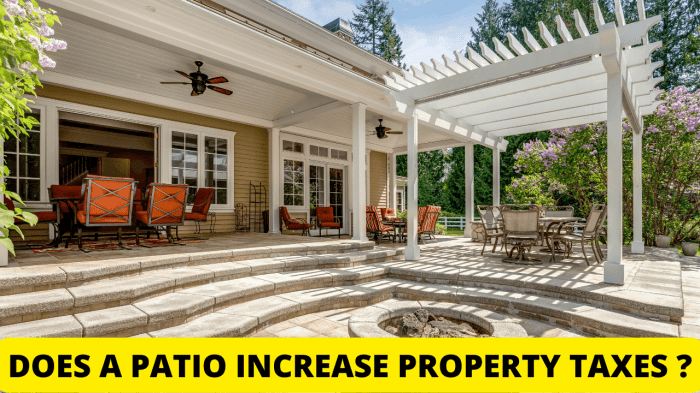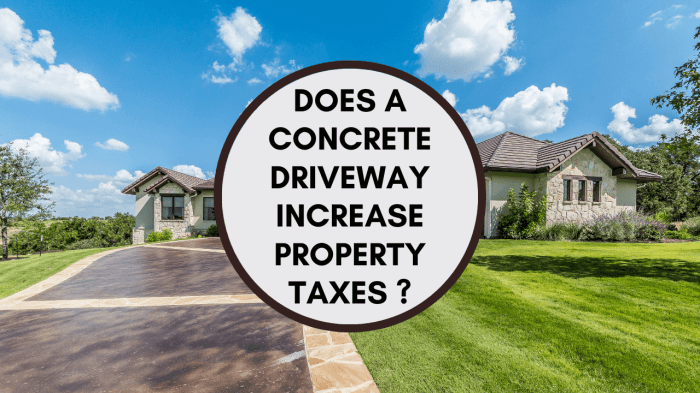Does a concrete patio increase property taxes? This question lingers in the minds of many homeowners contemplating enhancing their outdoor spaces. In this article, we delve into the intricate relationship between concrete patios and property taxes, examining the factors that influence value, regulations, maintenance costs, insurance implications, and environmental considerations.
Join us as we uncover the answers to this pressing question.
The following paragraphs provide a comprehensive analysis of each aspect, shedding light on the potential impact of concrete patios on property values and taxes.
Impact on Property Value
A concrete patio can significantly enhance the value of a property by increasing its perceived and actual worth. The size, design, and location of the patio are key factors that contribute to its value-enhancing potential.
Larger patios tend to add more value than smaller ones, as they provide more space for outdoor living and entertainment. Patios with attractive designs, such as stamped or stained concrete, can also increase property value by enhancing the home’s curb appeal.
The location of the patio is another important factor to consider. Patios that are located in private, secluded areas of the yard tend to add more value than those that are located in more visible areas. This is because private patios offer a greater sense of privacy and tranquility.
Examples of Value-Enhancing Concrete Patios, Does a concrete patio increase property taxes
- A large, stamped concrete patio with a built-in fire pit and seating area can add up to 10% to the value of a home.
- A stained concrete patio with a decorative border can add up to 5% to the value of a home.
- A concrete patio that is located in a private, secluded area of the yard can add up to 3% to the value of a home.
Local Regulations and Building Codes: Does A Concrete Patio Increase Property Taxes

The construction of concrete patios is governed by building codes and regulations that vary from one area to another. These regulations typically include requirements for permits, inspections, and setbacks.
Permits are required to ensure that the patio is built in accordance with local building codes. Inspections are conducted to verify that the patio is safe and structurally sound. Setbacks are required to ensure that the patio does not encroach on neighboring properties or public rights-of-way.
Potential Impact of Non-Compliance
Failure to comply with local building codes and regulations can have a negative impact on property taxes. In some cases, non-compliance can result in fines or even the removal of the patio.
Maintenance and Repair Costs
Concrete patios require ongoing maintenance and repairs to keep them in good condition. The cost of maintenance and repairs will vary depending on the type of concrete patio, the size of the patio, and the climate in which the patio is located.
Stamped and stained concrete patios require more maintenance than exposed aggregate concrete patios. This is because stamped and stained concrete patios are more susceptible to cracking and fading.
The size of the patio will also affect the cost of maintenance and repairs. Larger patios will require more time and materials to maintain and repair than smaller patios.
Estimated Lifespan and Maintenance Requirements
| Type of Concrete Patio | Estimated Lifespan | Maintenance Requirements |
|---|---|---|
| Stamped Concrete | 20-25 years | Regular cleaning, sealing, and repairs |
| Stained Concrete | 15-20 years | Regular cleaning, sealing, and repairs |
| Exposed Aggregate Concrete | 25-30 years | Minimal cleaning and repairs |
Impact on Homeowners Insurance

The addition of a concrete patio can have a small impact on homeowners insurance premiums. The size, location, and construction quality of the patio are all factors that can affect insurance rates.
Larger patios tend to increase insurance premiums because they are more likely to be damaged by storms or other events. Patios that are located in high-risk areas, such as floodplains, can also increase insurance premiums.
The construction quality of the patio is also a factor that can affect insurance rates. Patios that are built with high-quality materials and workmanship are less likely to be damaged and therefore less likely to result in an insurance claim.
Discounts and Incentives
Some insurance companies offer discounts or incentives for well-maintained concrete patios. This is because well-maintained patios are less likely to be damaged and therefore less likely to result in an insurance claim.
Aesthetic and Functional Benefits
Concrete patios offer a number of aesthetic and functional benefits. They can enhance the outdoor living space, improve curb appeal, and increase usable square footage.
Concrete patios are a great place to entertain guests, relax, and enjoy the outdoors. They can also be used to create outdoor kitchens, dining areas, and fire pits.
Concrete patios can also improve the curb appeal of a home. A well-designed patio can make a home look more attractive and inviting.
Design Ideas and Inspiration
- Stamped concrete patios can be designed to resemble a variety of materials, such as brick, stone, or wood.
- Stained concrete patios can be used to create unique and colorful designs.
- Exposed aggregate concrete patios can be used to create a rustic or natural look.
Environmental Considerations

Concrete patios can have a negative impact on the environment. The production of concrete releases greenhouse gases, and the mining of materials for concrete can damage ecosystems.
However, there are a number of ways to mitigate the environmental impact of concrete patios. These include using permeable pavers, incorporating drainage systems, and using recycled materials.
Eco-Friendly Concrete Patio Designs
- Permeable pavers allow water to drain through them, which reduces runoff and pollution.
- Drainage systems can be installed under concrete patios to collect and redirect runoff.
- Recycled materials, such as fly ash and slag, can be used to make concrete patios more sustainable.
Essential Questionnaire
Can a concrete patio add value to my home?
Yes, a well-designed and constructed concrete patio can enhance the perceived and actual value of a property by increasing outdoor living space, improving curb appeal, and providing additional square footage.
Do I need a permit to build a concrete patio?
Building codes and regulations vary by location. It is essential to check with local authorities to determine if a permit is required for your project.
How much does it cost to maintain a concrete patio?
Maintenance costs depend on the size, type, and condition of the patio. Regular cleaning, sealing, and repairs are typically required.
Can a concrete patio affect my homeowners insurance premiums?
Yes, the size, location, and construction quality of a patio can influence insurance rates. Well-maintained patios may qualify for discounts or incentives from some insurance companies.